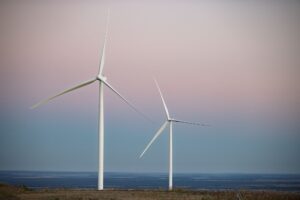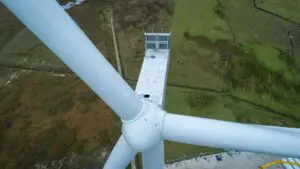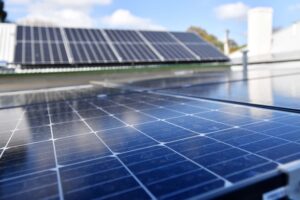One of the first low-cost renewable hydrogen projects in Western Australia has reached a critical milestone, signing a Binding Agreement to secure more than its needed supply of water for stage one of the project.
The Bristol Springs Green Hydrogen Project, located 120km south of Perth in Waroona Shire will, in stage one, comprise a 114 MW solar farm to power an electrolyser to produce more than 4 million kilograms of green hydrogen a year.
The project will be connected to the existing Landwehr Terminal, supplying excess solar power back to the South West Interconnected System (SWIS) grid.
Water is a crucial component of green hydrogen production: the clean-burning fuel is made by the electrolysis of water – splitting H2O into its constituent parts, hydrogen and oxygen – using electricity from renewable sources, in this case the onsite wind farm.
Without access to fresh water, the project would have had to rely on a costly desalination plant.
Frontier Energy, owner of the Bristol Springs project, signed the agreement with Western Australia’s government-owned Water Corporation to deliver up to 1,250 Kl/day to the project.
The water will be supplied via the existing Stirling Trunk Main, located three kilometres from the project site, which siphons water from the Southern Dams and the Southern Seawater Desalination Plant to the Integrated Water Supply Scheme (IWSS).
The agreement allows for the provision of sufficient water for use in a 150 MW electrolyser. That piece of equipment is more than four times the size of the 36MW electrolyser originally proposed for stage one, meaning the project will have ample room for future expansion.
The water supply is slated to commence on or before 31 December 2024, provided the project achieves a Final Investment Decision, and will run for fifteen years. Hydrogen production is expected to begin in 2025.
“We are delighted to have executed this essential agreement with Water Corporation and thank them and the Western Australian Government for their continued support for our project,” said Frontier Managing Director Sam Lee Mohan.
“Being located three kilometres from one of the major water pipelines in WA yet again highlights the advantage this Project has in being able to access existing infrastructure,” he said.
“Without this, a desalination facility would be required, which would add millions to the Project’s development cost, as well as add significantly to first production timeline, due to the requirement for additional approvals and environmental studies.”
“Comprising two parts hydrogen, water is essential for renewable hydrogen production and Water Corporation’s long-term supply agreement with Frontier Energy is a win-win, and an important milestone in developing the renewable hydrogen industry in WA,” added Western Australia’s Water Minister Simone McGurk.
“In one of the most climate-impacted regions on earth, renewable hydrogen will help decarbonise WA and support a strong, resilient, and diversified economy.”
Western Australia has bold ambitions for a renewable hydrogen industry to bolster its economic security in a decarbonising world.
This latest Agreement is part of the McGowan Government’s $162 million hydrogen investment scheme, under the Renewable Hydrogen Strategy the government published in 2019.
The government has also invested heavily in research and development, including promising co-funding for a so-called electrolyser ‘gigafactory’ in May last year, as it looks to entice hydrogen technology producers to base themselves in the state.
“The Bristol Springs Project is a fantastic example of a WA firm leading the way to becoming one of the lowest cost producers of Australian-made renewable hydrogen,” said WA Hydrogen Industry Minister Roger Cook.
“The McGowan Government is committed to assisting such emerging hydrogen production projects, as we work to establish WA as a significant producer, exporter and user of renewable hydrogen.
“Renewable hydrogen will be critical for hard-to-abate sectors, such as industrial processing and transport, to reduce their emissions and help the State achieve net zero greenhouse gas emissions by 2050.”







